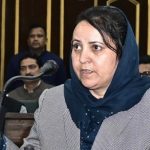Srinagar, June 12: Vice Chancellor SKUAST-K, Prof M A A Sidiqui on Monday expressed concern over the ecological imbalance created by human interference; saying under the concept of one earth, every human being is impacted by climate change which may occur in any part of the earth.
“We need to take refuge of renewable energies, carbon capture utilization and storage development of accurate climate models, refining project perceptions and sustainable land management practices through smart agriculture,” the VC said, adding that the important aspect of the climate change impact on human behaviour and attitude needs to be taken seriously.
According to a SKUAST-K release issued here, the Division of Basic Sciences and Humanities, Faculty of Horticulture, SKUAST-Kashmir in association with Sher-e-Bangla Agricultural University, Bangladesh, Mid-West University Nepal, University of Agricultural Sciences Raichur Karnataka, Vasantrao Naik Marathawada Krishi Vidyapeeth Parbhani, India and Agricultural & Environmental Technology Development Society (AETDS), India, organized an international conference on climate change and its impact (CCI 2023) from June 09 to 11 at Shalimar campus of SKUAST-K, Srinagar. The conference was attended by more than four hundred delegates from India and abroad including, the USA, Nepal, Bangladesh, Malaysia, etc.
During the session eminent personalities like Dr P V Vara Prasad, Global Millet Ambassador of India Director, Sustainable Intensification Innovation Lab University Distinguished Professor, Crop Eco-physiology, Kansas State University, Kansas 66506, USA spoke about the Global and Indian perspective of climate change vis-a-vis agriculture.
Prof Dr Md Shahidur Rashid Bhuiyan, Vice-Chancellor, Sher-e-Bangla Agricultural University, Bangladesh in his address stressed the awareness of each individual about the seriousness of climate change and its impact on future generations. He said the conference has helped to sensitize not only the scientists, policymakers, and marketing personnel but also the students and scholars about the snags confronted by stakeholders and shown a pathway to denude the untapped potential of agriculture.
The conference also deliberated over the stimulated multi-disciplinary research on climate change and food security in South Asia and suggested identifying effective mitigation and adaptation options, including carbon sequestration in different ecosystems.
The speakers during the conference said that Climate-Smart Agriculture (CSA) based technologies and practices present prospects for addressing climate change challenges, including economic growth and development.
They said a knowledge-based, multi-disciplinary and participatory approach can be developed by initiating and strengthening cooperation among academic and research institutions, international organizations, and NGOs to provide opportunities for strengthening institutions, human resource development, and capacity building.





